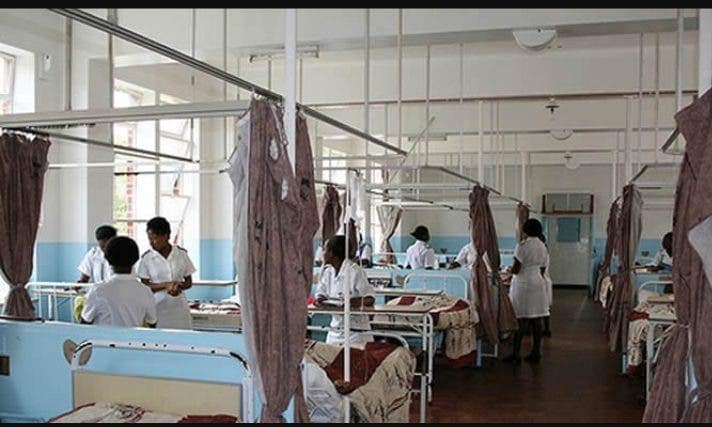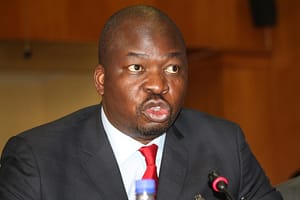Patients face death as hospital strike rages on

WRITHING in pain, Owen Togara (pictured) sits uncomfortably in a wheelchair clutching his bleeding leg at Parirenyatwa Hospital in Harare.
Togara was involved in a near-fatal accident in Shurugwi on Monday on his way from a funeral together with half a dozen relatives aboard a combi.
Of the six on board, Togara, his young brother whose thigh was ripped off in the accident and his uncle were injured.

With nurses and doctors on strike, the family were left stranded at Parirenyatwa where they had hoped to seek medical attention.
Arriving at the hospital at midnight on Monday, Togara and his family were dismayed to hear that no one was willing to attend to them.
“We had to beg those on duty to admit my brother who suffered a bad injury on his thigh. He is inside, but they haven’t attended to him. He was crying all night, we did not know what to do,” he told The NewsHawks.
As he recounts their heart-wrenching ordeal, a relative listening carefully weighs in.
“We are stranded here and had to sleep in the combi. There was blood all over because the wounds are still fresh. This is disheartening. The strike has really affected some of us who depend on the public health system for help,” the relative said.
The family is contemplating seeking medical attention at the Salvation Army-run Karanda Mission Hospital in Mt Darwin, which offers services even when health professionals are on strike.
His uncle, Tobias Shavane (65), is sitting under a tree with a broken arm. They have used cardboard to support the arm.
“I slept here but no one is attending to me. The nurses and doctors say they should be paid more money before they can treat me,” lamented Shavane.
A dirty bandage served as a sling for his arm while his swollen hand was strapped to a blood-stained piece of cardboard.
He was visibly in pain and requiring urgent medical attention.
“I am in pain, but there is nothing I can do. They say the nurses are on strike, so we just must look for help elsewhere. This strike is affecting us,” Shavane said.
Shavane is among thousands of patients who are stranded in the wake of the health workers’ strike.
Staff at the public health facilities went on strike after refusing a below-inflation salary increase offered by the government last week.
Desperate patients sat in the hospital parking lot or in the hospital grounds with little hope of getting help.
When The NewsHawks spoke to Miriam Matembo, she was contemplating visiting a prophet to get help.
“They told me my situation is not an emergency. I have nowhere else to go because I can’t afford to go to a private hospital,” said Matembo, who brought her 11-year-old daughter who was suffering from stomach pains. The girl lay on the ground, visibly in pain.
“I may just have to return home with her or visit a prophet.”
Most of the nurses who received a monthly salary of ZW$20 000 last week, protested the poor pay in a bid to force the government to act.
With the authorities refusing to give in, maintaining that they will not pay salaries in US dollars, nurses and doctors say they will continue to press their demand for better pay as the local currency slumps.
While nurses and doctors protested in a courtyard at Parirenyatwa Hospital, patients lay helplessly on patched grass and under trees.

Those who arrived at the hospital at midnight on Monday had not been attended to by Tuesday afternoon, with many being turned away.
The government and health workers have reached an impasse after inflation quickened to 131.7% in May, a grim echo of the hyperinflation that wiped out people’s savings and pensions a decade ago.
Zimbabwe Nurses’ Association leader Enock Dongo said patients are bearing the brunt of the strike, which has now lasted a week.
“Patients are stranded. It is an urgent issue which we call upon the President to urgently address,” Dongo said.
He said the Health Service Board had also refused to meet the medical professionals for the past 14 months.
He added that people will die because of the Health Service Board’s arrogance.
“If you look at the number of the health workers outside, and the brain drain that has happened over the past months, it means we are already short staffed. To have this
large number of health workers outside, we know that there is a disaster in there. We call urgently a dialogue with government. This should not go for 24 hours then we are going to lose lives. It is not good for our country,” Dongo said.
Health workers are demanding a minimum monthly salary of US$540, the pay they used to receive in 2018 before the local currency slumped.
Deputy Information minister Kindness Paradza said the government was working on solving the crisis.
“Government is currently seized with the issue of addressing renumeration gaps affecting the entire civil service. Already, a 100% pay rise has been effected across the board on top of the US$175 Covid allowance,” Paradza said.
President Emmerson Mnangagwa, who took over from long-time leader Robert Mugabe following a 2017 military coup, has struggled to stem the raging economic crisis. —NewsHawks





